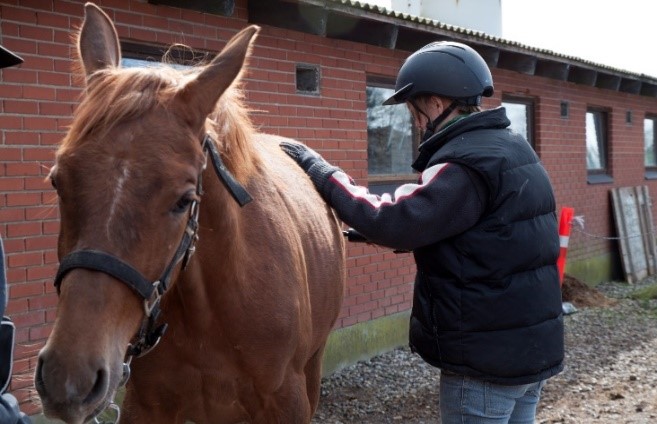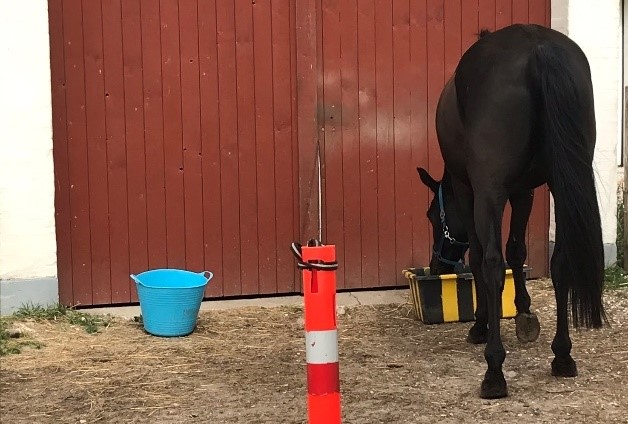Horses’ curiosity increases their learning ability
Curiosity and learning ability go hand in hand. We know this from humans and non-human primates, but for the first time it has now also been scientifically demonstrated in horses in a new study conducted at Aarhus University.
![[Translate to English:] Føllets nysgerrighed overfor nye objekter afspejler dets nysgerrighed senere i livet og afslører muligvis også dets indlæringsevne. Nye forskningsresultater viser, at nysgerrige heste har lettere ved at lære nye opgaver. Foto [Translate to English:] Føllets nysgerrighed overfor nye objekter afspejler dets nysgerrighed senere i livet og afslører muligvis også dets indlæringsevne. Nye forskningsresultater viser, at nysgerrige heste har lettere ved at lære nye opgaver. Foto: Janne W. Christensen.](/fileadmin/_processed_/e/d/csm_fol_gule_kurve_33f839b795.jpg)
Research at Department of Animal Science, Aarhus University, has demonstrated that horses displaying curiosity towards novel objects also are the ones doing the best job when learning new tasks. These are the results from a study examining the association between horses’ curiosity and learning ability. Behind the research is associate professor Janne W. Christensen who has conducted research in stress biology and learning ability in horses for many years. In previous studies at Aarhus University, she has demonstrated that fearfulness has a negative impact on learning ability and performance ability.
“Our new results show that curious horses did better in two different learning tests compared to non-curious horses. And if a horse was curious when it was a foal, this was most likely also the case later in life”, says Janne W. Christensen. According to Janne W. Christensen, the result is interesting for further research but also for everybody handling horses: “This is important knowledge in practice because we are dependent on the horse’s learning ability when it comes to the training of and our relation to the horse”, she explains.
The current study included 44 Danish Warmblood foals (16 stallions and 28 mares) from the same stud. The study was part of a larger research project studying interactions between mare and foal. During the study, novel object tests were conducted, measuring the horses’ fear reactions and curiosity towards novel objects. The behavioural reactions from the novel object tests were compared to the horses’ learning ability in two types of learning tests.
Test of the foals’ fearfulness
At the age of approximately 5 months, the foals were subjected to a fear test consisting of placing various novel objects between the entrance of the test arena and the mare. Thus, the foal had to pass the objects on its way to the mare while its reactions (behaviour and heart rate) were recorded. Some foals passed the objects quickly on their way to the mare while other foals began examining the objects or even began playing with them. This reaction later showed to be connected with the foals’ learning ability, as the curious foals did better in learning tests around 1 year of age compared to the non-curious foals.
Two types of test of the foals’ learning ability
A couple of months after weaning ( at 7–9 months of age), Line Peerstrup Ahrendt studied the horses’ learning ability as part of her PhD project. “We used a so-called discrimination test where the horses should learn to choose the correct of two different buckets changing place in a certain order (Figure 1, right). The fewer mistakes the horses make, the better learning ability during the test”, says Janne W. Christensen.
Moreover, the researchers did a test based on negative reinforcement in which the horses should learn to move to the side to avoid pressure on the hindquarter. An algometer was used for this, measuring exactly how much pressure it takes before the horse moves (Figure 1, left). “The better learning ability, the steeper the slope of its learning ability curve, meaning that it takes less and less pressure to move the horse. Much training and riding is based on this kind of learning (i.e. negative reinforcement, for example rider leg pressure and rein tension)”, explains Janne W. Christensen.
 |
|
Figure 1. When the horses were 1 year old, their learning ability was studied in two completely different types of learning tests. In one of the tests (learning via negative reinforcement), the horses should learn to step to the side to avoid pressure applied with an algometer on the hindquarter (left picture). In the other test (discrimination test), the horses should learn to choose the correct bucket, placed either to the right or left in a predetermined order, to get a feed reward (right picture). Photos: Janne W. Christensen.
The curious horses did best in both learning tests
It turned out that the horses that had been curious foals were also curious yearlings. Furthermore, the researchers found that the curious horses did better in both learning tests: they made fewer mistakes in the discrimination test, and they had a steeper learning curve in the pressure test, meaning that less and less pressure was necessary to make them step to the side compared to non-curious horses.
“Thus, our results indicate that curious horses have a better learning ability, which has not previously been demonstrated in horses or other farm animals. It could be very exciting to study whether it is possible to increase horses’ curiosity by systematically rewarding them for being curious towards novel objects – for example during a sensitive period at a young age – and whether such a manipulation of curiosity also results in a better learning ability. I hope to be able to find funding to study this in the future”, concludes Janne W. Christensen.
Facts about the project
CollaborationChristine Nicol, Royal Veterinary College, UK: supervisor for PhD-student Line Peerstrup Ahrendt who managed the learning tests. |
FundingThe project was funded by the Danish Research Council for Technology and Production (Grant no. 11-107010) and by the Danish Center for Research on Welfare in Companion Animals through a grant from “Skibsreder Per Henriksen, R. og Hustrus Fond". |
More information
Link for the scientific publication: J.W. Christensen, L.P. Ahrendt, J. Malmkvist og C. Nicol, 2020. Exploratory behaviour towards novel objects is associated with enhanced learning in young horses Previous study of the association between fearfulness, stress and learning ability: Does learning performance in horses relate to fearfulness, baseline stress hormone, and social rank? https://www.sciencedirect.com/science/article/pii/S0168159112001682?via%3Dihub J.W. Christensen, L.P. Ahrendt, Lintrup, R., Gaillard, C., Palme, R., Malmkvist, J., Does learning performance in horses relate to fearfulness, baseline stress hormone, and social rank? Applied Animal Behaviour Science 140, 44-52. |
ContactJanne Winther Christensen, Department of Animal Science, Aarhus University. E-mail: jwc@anis.au.dk |

